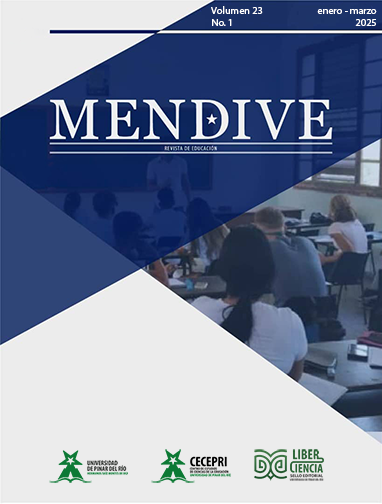Teaching and learning process of the Television Fundamentals subject: Theoretical references
Main Article Content
Abstract
This article presents a descriptive study of the teaching-learning process in the subject of Television Fundamentals in the Telecommunications and Electronics Engineering program. The objective is to characterize the main theoretical references of the process, emphasizing the relationship of its components to develop modes of action and work performance of graduates once they graduate. A set of theoretical and empirical methods were used, which allowed interpreting, from a dialectical materialist methodological basis, the historical evolution of the teaching-learning process and its contextualization in the teaching of the subject, as well as to substantiate each of its elements. The results obtained from the applied instruments allowed identifying the main weaknesses in relation to the components of the process and that influence the development of students in the problems of their professional profile and specific within the objectives of the subject under study. The main results are concentrated in the initial diagnosis of the teaching-learning process, determining each of the existing needs and deficiencies. In summary, the teaching-learning process in the studied context should contribute to the integral formation of students, promoting the acquisition of competences, knowledge, abilities, skills and values. In addition, this process must be developmental, contextualized and professionalized to favor a competent professional performance, allowing graduates to be in accordance with the current educational demands in Cuba.
Downloads
Article Details

This work is licensed under a Creative Commons Attribution-NonCommercial 4.0 International License.
References
Aras, R. E. (2017). Los nuevos aprendizajes del sujeto digital. Cuadernos del Centro de Estudios de Diseño y Comunicación, (64), 107-121. https://doi.org/10.18682/cdc.vi64.1209
Catal, C., & Tekinerdogan, B. (2019). Aligning Education for the Life Sciences Domain to Support Digitalization and Industry 4.0. Procedia Computer Science, 158, 99-106. https://doi.org/10.1016/j.procs.2019.09.032
De Brito Salazar, C., Pardo Gómez, M. E., & Soler Rodríguez, R. (2022). Ecosistema digital de educación 4.0. Una propuesta de innovación para la formación universitaria. REFCalE: Revista Electrónica Formación y Calidad Educativa, 10(2), 187-200. http://refcale.uleam.edu.ec/index.php/refcale/article/view/3605
Echeverría Samanes, B., & Martínez Clares, P. (2018). Revolution 4.0, Skills, Education and Guidance. Revista Digital De Investigación en Docencia Universitaria. 12(2), 4-34. https://doi.org/10.19083/ridu.2018.831
Fernández Cruz, F. J., Fernández Díaz, M. J., & Rodríguez Mantilla, J. M. (2018). El proceso de integración y uso pedagógico de las TIC en los centros educativos madrileños. Educación XX1, 21(2), 395-416. https://revistas.uned.es/index.php/educacionXX1/article/view/17907
Ellahi, R. M., Khan, M., & Shah, A. (2019). Redesigning Curriculum in line with Industry 4.0. Procedia Computer Sáciense, 151, 699-708. https://doi.org/10.1016/j.procs.2019.04.093
García Meneses, M., Díaz de la Cruz, J., & Coloma Rodríguez, O. (2021). Estrategia para la integración de las Tecnologías de la Información y las Comunicaciones en la formación inicial de docentes. EduSol, 21(75), 96-108. http://scielo.sld.cu/scielo.php?script=sci_arttext&pid=S1729-80912021000200096&lng=es&tlng=es
Garcés, G., & Peña, C. (2020). Ajustar la Educación en Ingeniería a la Industria 4.0: Una visión desde el desarrollo curricular y el laboratorio. Revista de Estudios y Experiencias en Educación, 19(40), 129-148. https://doi.org/10.21703/rexe.20201940garces7
Goldin, T., Rauch, E., Pacher, C., & Woschank, M. (2022). Reference Architecture for an Integrated and Synergetic Use of Digital Tools in Education 4.0. Procedia Computer Science, 200, 407-417. https://doi.org/10.1016/j.procs.2022.01.239
Haleem, A., Javaid, M., Qadri, M. A., & Suman, R. (2022). Understanding the role of digital technologies in education: A review. Sustainable Operations and Computers, 3, 275-285. https://doi.org/10.1016/j.susoc.2022.05.004
Hernández Garcés, A., & Avilés Rodríguez, E. (2019). Desarrollo de habilidades informáticas en la disciplina Química Orgánica. Opuntia Brava, 18(5), 254-263. https://mendive.upr.edu.cu/index.php/MendiveUPR/article/view/1460
Nieto Taborda, M. L., Vásquez-Rizo, F. E., Gabalán-Coello, J., & Castro-Peña, M. Y. (2020). La transformación digital en la formación universitaria: una postura desde la Educación 4.0. En M. Della Volpe & A. Jaramillo-Gutiérrez (Eds.), Educación digital, inclusión, emprendimiento (pp. 235-257). Universidad Católica de Pereira. Biblioteca Cardenal Darío Castrillón Hoyos. https://doi.org/10.31908/eucp.62.c622
Putnik, G., & Alves, C. (2022). Social Network-based Education and Education 3.0: Application for education on Design and teaching of Industry 4.0 concepts. Procedia CIRP, 109, 659-665. https://doi.org/10.1016/j.procir.2022.05.310
Sonntag, D., Albuquerque, G., Magnor, M., & Bodensiek, O. (2019). Hybrid learning environments by data-driven augmented reality. Procedia Manufacturing, 31, 32-37. https://doi.org/10.1016/j.promfg.2019.03.006
Tejada Fernández, J., & Pozos Pérez, K. V. (2018). Nuevos escenarios y competencias digitales docentes: Hacia la profesionalización docente con TIC. Profesorado, Revista de Currículum y Formación del Profesorado, 22(1), 25-51. https://doi.org/10.30827/profesorado.v22i1.9917


